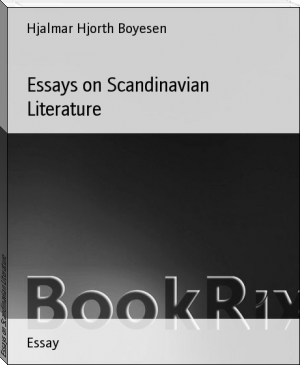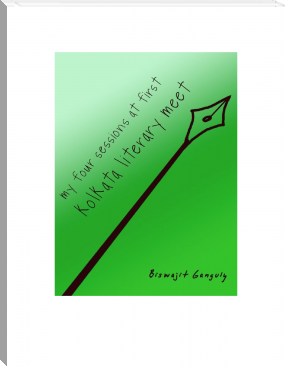Essays on Scandinavian Literature, Hjalmar Hjorth Boyesen [best ebook reader ubuntu txt] 📗

- Author: Hjalmar Hjorth Boyesen
Book online «Essays on Scandinavian Literature, Hjalmar Hjorth Boyesen [best ebook reader ubuntu txt] 📗». Author Hjalmar Hjorth Boyesen
And the loosened torrents downward singing to the ocean run;
Glowing like the cheek of Freya, peeping rosebuds 'gin to ope,
And in human hearts awaken love of life and joy and hope."
The canto called "The Temptation" contains the most dramatic and altogether the most beautiful situation in the poem. The old king, feigning weariness, begs Frithjof to tarry with him alone, while he takes a rest. Frithjof tries to dissuade him, but in vain.
"Then threw Frithjof down his mantle, and upon the green sward
spread;
And the ancient king, so trustful, laid on Frithjof's knee his head;
Slept as calmly as the hero sleepeth after war's alarms
On his shield, calm as an infant slumbers in its mother's arms."
Then the temptation comes to Frithjof to slay the old man who had stolen his bride; but after a brief struggle he hurls his sword far away into the forest.
"Straight the ancient king awakens. 'Sweet has been my sleep,' he
said.
'Pleasant 'tis to sleep in shadow, guarded by a brave man's blade.
But where is thy sword, O stranger, lightning's brother, where is
he?
Who has parted one from other that should never parted be?'"
"'Not a whit care I,' said Frithjof, 'I shall find a sword some day;
Sharp, O King, are tongues of falchions, words of peace they seldom
say;
In the steel dwell swarthy demons, demons strayed from Nifelhem,
No man's sleep to them is sacred, silver locks embitter them.'
"'Youth, no moment have I slumbered, but to prove thee feigned to
rest,
Unproved men and weapons never trusts King Ring without a test.
Thou art Frithjof. I have known thee since thou first cam'st to my
hall;
Much that thou hast hidden from me; from the first I guessed it
all.'"
Soon after this interview the aged king feels death approaching; and in order not to go to the dark abode of Hela, he cuts death-runes upon his breast and ascends to Odin's bright hall. But before dying he gives Ingeborg to Frithjof, and makes him the guardian of his son. The people, in _Thing_ assembled, glorying in Frithjof's great renown, desire, however, to make him King's successor; but he lifts the small boy above his head upon his shield and proclaims him king. He returns home and rebuilds Balder's temple, whereupon the sentence of outlawry is removed, and he is reconciled to Ingeborg's brothers and marries the beloved of his youth.
The last canto, called "The Atonement," is perhaps the most flagrant violation of historical verisimilitude in the whole epic. A hoary priest of Balder actually performs the wedding ceremony in the restored temple, and pronounces a somewhat unctuous wedding oration, which differs from those which Tegnér himself had frequently delivered chiefly in the substitution of pagan for the Christian deities. As a matter of fact, marriage was a purely civil contract among the ancient Norsemen, and had no association with the temple or the priesthood, which, by the way, was no separate office but a patriarchal function belonging to the secular chieftainship. But Tegnér's public were in nowise shocked by anachronisms of this sort; they probably rejoiced the more heartily in the happiness of the reunited lovers, because their marriage was, according to modern notions, so "regular."
It was soon after his publication of "Frithjof's Saga" that Tegnér became Bishop of Wexiö. He then removed from Lund and took up his residence upon the estate Oestrabo, near the principal town in his diocese. The great fame of his poem came to him as a surprise; and he even undertook to protest against it, declaring with perfect sincerity that he held it to be undeserved. In letters to his friends he never wearied of pointing out the faults of "Frithjof" and his own shortcomings as a poet. In a letter to the poet Leopold (August 17, 1825), who had praised the poem to the skies, he argues seriously to prove that his admiration is misplaced:
"My great fault in 'Frithjof' was not that I chose my theme from
the old cycle of sagas, but that I treated it in a tone and with a
manner which was neither ancient nor modern, neither antiquarian
nor poetical, but hovered, as it were, on the boundary of both. For
what does it mean to treat a subject poetically if not this, to
eliminate everything which belongs to an alien and past age and now
no longer appeals to any heart? The hearts to which it once did
appeal are now all dust. Other modes of thought and feeling are
current. It is impossible to properly translate one age into
another. But to poetry nothing is really past. Poetry is the
beautifying life of the moment; she wears the colors of the day;
she cannot conceive of anything as dead.... But I am convinced that
all poetic treatment of a theme belonging to a past age demands its
modernization; and that everything antiquarian is here a mistake.
This holds good not only in regard to the northern tone but also in
regard to the Greek. Look, for instance, at Goethe's 'Iphigenie.'
Who does not admire the beautiful, simple, noble, Hellenic form?
And yet who has ever felt his soul warmed by this image of
stone?... No living spirit has been breathed into these nostrils;
the staring eyes gaze upon me without life and animation; no heart
beats under the Hellenically rounded marble bosom. The whole is a
mistake, infinitely more beautiful than 'Frithjof,' but fashioned
according to the game principles of art. The Greeks said that the
Muse was the daughter of Memory; but this refers only to the
material, the theme itself, which is everywhere of minor
consequence. The question, then, is as to the proper treatment.
Where it tends toward the antiquarian it misses the mark; it
represents, like 'Frithjof,' only a restored ruin."
This passage is by no means the only one in which Tegnér, with an utter absence of vanity or illusion, judged his work and found it wanting. There is no mock modesty in his manly deprecation of the honors that were showered upon him; but as a father knows best the faults of his child whom he loves, so he knew the defects of his work, as measured by his own high standard, and refused to accept any more praise than was his due. Not even the fact that Goethe expressed his admiration of "Frithjof's Saga" could persuade him that he was entitled to the extravagant homage which his enthusiastic countrymen accorded him. There were even times when he disclaimed the title of poet. Whether he was forgotten a little sooner or a little later, he said, was a matter of small moment.
"Speaking seriously," he writes in 1824 (accordingly before the publication of "Frithjof"), "I have never regarded myself as a poet in the higher significance of the word.... I am at best a John the Baptist, who is preparing the way for him who is to come."
He is always just and inclined to be generous in his judgment of every one except himself. It is necessary, however, after the year 1824, to make due allowance for the terrible strain upon his mind which disposed him to give violent and hyperbolical expression to the mood of the moment. The unhappy passion which he could at times smother, but never subdue, went boring away into his heart like a subterranean fire, consuming his vitals, and occasionally breaking forth into a wild blaze. The following reference to it, in his letter to Franzén (November 13, 1825), is very pathetic:
"It is to-day my forty-third birthday. I have thus long since
passed the highest altitude of life where the waters divide. With
every year one now becomes smaller and smaller; one star is
extinguished after another. And yet the sun does not rise. One dies
by degrees and by halves. Therefore only children and youth ought
to celebrate their birthdays with joy; we who have passed into the
valley of age, which with every step is growing darker and
chillier, are right in celebrating them with--whims.... However,
this is not my only or my greatest affliction, I have had and have
others. But the night is silent and the grave is dumb, and their
sister, Sorrow, should be as they. Therefore--let this suffice."
December 29th. "Alas, this old year! What I have suffered in it no
one knows, if not, perhaps, the Recorder beyond the clouds. But I
am indebted to this year. It has been darker, but also more serious
than all the others put together. I have learned at my own expense
what a human heart can endure without breaking, and what power God
has deposited in a man under his left nipple. As I say, I am under
obligation to this year, for it has enriched me with what is the
real sinking fund of human wisdom and human independence--a mighty,
deeply rooted contempt for man.... My inner nature emerges from the
crisis like the hibernating bear from his den, emaciated and
exhausted, but happily with my ursine sinews well preserved; and by
and by some flesh will be growing on them again. It seems to me
that my old barbaric, Titanic self, with its hairy arms, is
constantly more and more rubbing the sleep out of its eyes. I hope
that some vine may still grow upon the scorched and petrified
volcano of my heart."
January, 1826. "But when one is compelled to despise the
_character_ of a human being, especially of one who has been or is
dear to one, then that is the bitterest experience which life can
afford; then it is not strange if a frank and ardent soul turns
with loathing from this false, hypocritical generation and shuts
himself up, as well as may be, in the hermitage of his own heart.
"My mind is unchristian, for it has no day of rest. Generally I
think that my disease has its seat in the abdomen or in the waist.
Mineral waters I can no more drink this summer. But is there not a
mineral water which is called Lethe?
"Whether my little personality returns thither whence it came, with
or without consciousness, a few months later or earlier, in order
to be drowned in its great fountain-head, or to float for some time
yet like a bubble, reflecting the clouds and





Comments (0)